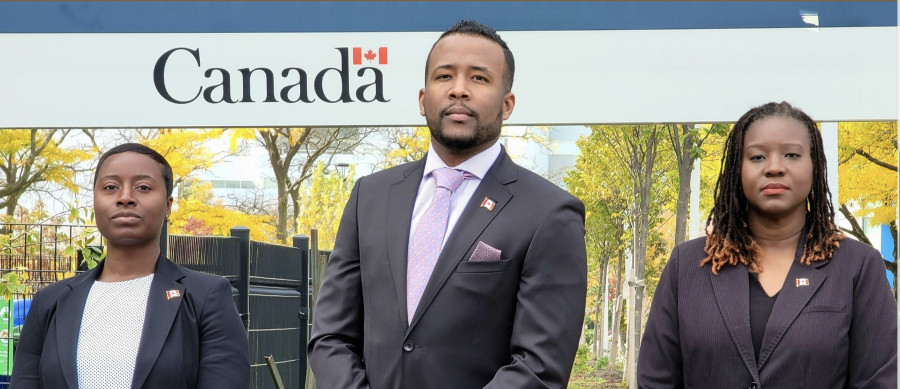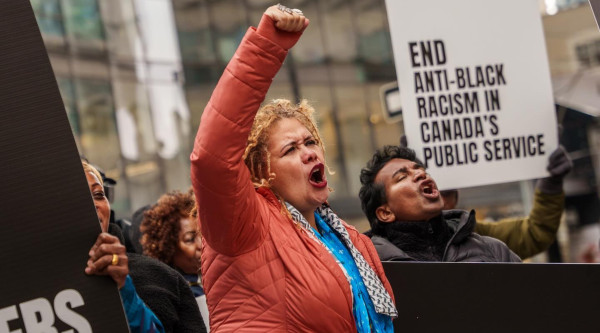Black employees called the institution “toxic and dismissive” and that Black employees' complaints were actively deprioritized.
The report shed new light on an ongoing 2020 lawsuit filed against the federal government for discriminatory practices against Black public service employees. The class action is being brought by a group known as the Black Class Action (BCA), accusing the federal government of systemic racism and employee exclusion. It alleges that, since the 1970s, roughly 30,000 Black civil services employees have lost out on "opportunities and benefits afforded to others based on their race."
Filed on behalf of Black civil service members, this lawsuit wants the government to compensate employees for lost opportunity wages, create a mental health fund to help employees deal with anti-Black racism, and also give Black employees a special designation outside the blanket ‘minority’ label within the formal law.
According to the Employment Equity Act, federal law requires federally regulated organizations and businesses to provide equal employment opportunities to four designated groups: women, Aboriginal peoples (Indian, Inuit or Métis), and people with disabilities. and members of visible minorities. The BCA claims that categorizing Black people with minorities hides the specific and often more profound forms of systemic discrimination perpetrated against Black employees specifically. And statistics back this up.
Treasury Board statistics found through the PSAC union show that Black workers tend to be clustered in lower-level administrative categories. The BCA claims lack of advancement is common in public services, with some Black employees spending 30 years in the same entry-level position. The study also showed Black workers represent the largest group of racialized workers in the federal government at 3.2 percent yet represent only 1.6 percent of those at the executive level. So either the federal government could not find any capable Black employees to promote, or more likely these indicators show the repeated incidence of mistreatment and discrimination.
Courtney Betty, a diversity consultant and one of the lawyers working with BCA said as much in our interview:
“So we're looking at all the government departments and finding out that statistically, based on the government's data, Black employees certainly have not been promoted at the same statistical rate. At the end of the day, that's the essence of the claim.”
Since the lawsuit was first filed the BCA and the federal government have been at odds on how to move forward. While the BCA believes the courts should handle this matter, the federal government sees it another way. A motion filed on behalf of the federal government says the BCA case should be brought to the CRHC – the government’s own human rights watchdog mandated to fight racism and discrimination as a labour grievance or human rights allegation. Systemically this is how Canada works. If there is a problem with the government then you can go talk to another part of the government
The convoluted system of accountability is no accident according to Betty, who first started with the BCA after a presentation made about the case to the CRA, right after the murder of George Floyd. As someone who has been fighting discrimination for years, Betty is all too knowledgeable about the structures of oppression. But this lawsuit is massive as he will be representing 30,000 Black employees. This does not phase him anymore.
“In fighting systemic racism and discrimination, you face systemic racism and discrimination. This is a battle that my work at the Department of Justice and many other cases have prepared me for.”
I then had to ask him how exactly the BCA expects to get any justice from a place of injustice. At many turns the government has proved incapable of dealing with its own prejudice against Black people, much less acting as a fair arbiter. I mean you can't milk a cow to get coffee, so why go to the government to get justice? How does the BCA hope to find success?
“Success for me is changing the system. And we're already getting those changes happening. We're going to see it happening with Employment Equity Act changes. There's a senate review that's looking at the Human Rights Commission. We've got a mental health fund of about $49 million that's been put together by the federal government for Black public service workers to get mental health help. So what we're doing is we're trying to break down each of these. It is one punch at a time. There's no knockout here.”
He is right about that. The BCA has been working for years on this case because of the sheer size of it. His team began collecting information on employee cases of discrimination by holding Zoom sessions, and as each story was told others began to tell their stories. Betty says it was a tough but necessary job.
“The stories are all shocking. What became clear was that racism destroys each person's mental health which impacts all areas of their lives. In the words of one of our experts Dr. Uriana Clark It is death by 1000 paper cuts.”
One of the most egregious cases is that of Black civil servants in the Canadian Human Rights Commission. One former employee Bernadeth Betchi spoke to CBC News about the barriers Black employees face with the agency tasked with protecting vulnerable groups:
“Whenever a case of racial discrimination was brought to the all-white team, they would often dismiss them. There is no avenue for Black employees to reach into senior management."
If the CHRC does not want to take the grievances of their own employees seriously how can Prime Minister Trudeau expect them to fairly rule on other cases of anti-Black racism? Solidarity against racism in the government, cannot be built with its institutions. Canadians will need to work with other nongovernmental groups if they are serious about change.
After the federal government failed to take the grievances of the BCA seriously, unions representing over 3 million workers called on the government to settle the class action. As representatives of public service employees of all colours, unions have much larger networks to pressure and force the federal government into arbitration with the BCA. It is in the DNA of the union movement to stick up for employees because workers run them. So when workers cannot turn to a discriminatory human rights commission for redress, unions need to step in using their powers of collective action like petitioning, protest and civil disobedience.
But systemic discrimination is not limited to the federal government. “The unions are there with us. I think there's a lot more that they can do,” says Betty. According to him, unions are usually a step behind when it comes to issues of racial discrimination. Issues of race or discrimination are rarely in the purview of unions, who like to deal squarely with economic issues. Unions also have their own problems with discrimination as many leadership positions are not reflective of the diversity inside the union.
‘If you look at the Senate hearings that took place, I think one of the senators asked the head of the Public Service Alliance of Canada (union), like, what measures have you guys taken? And I think his response was, we're planning to. And then she responded to him and said, I'm totally shocked that at this stage you guys are still planning. So that's the kind of thing there's a lot of, even within its own organization, some of the challenges that we're fighting on the employment side exist within the union organization,” explained Betty.
Without the strength of unions, the fight against discriminatory hiring will be that much tougher. As Black and Brown employees take up more space in public services, unions need to become inclusive and proactive around discrimination.
I asked Courtney what was important for everyone to know about this case.
“I just think that people have to recognize that we're fighting for Canada. This is what I believe. Multiculturalism, opportunities, and merit-based, are all the fundamental things that we as Canadians hold dear. This is not just about Black people and Black workers. This is about all Canadians.”

 By
By 






